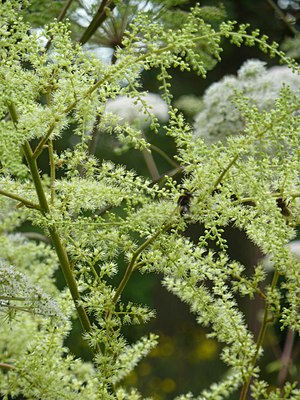Splendid brook spar
| Splendid brook spar | ||||||||||||
|---|---|---|---|---|---|---|---|---|---|---|---|---|

Bach splendor spar ( Astilbe rivularis ) |
||||||||||||
| Systematics | ||||||||||||
|
||||||||||||
| Scientific name | ||||||||||||
| Astilbe rivularis | ||||||||||||
| Buch.-Ham. ex D.Don |
The Bach Astilbe ( Astilbe rivularis ) is a plant of the genus Astilbe ( Astilbe ) in the family Saxifragaceae (Saxifragaceae).
features
The brook splendor is a perennial , herbaceous plant that reaches heights of 60 to 250 centimeters. A rhizome is formed as a permanent organ. The stems , petioles and undersides of the leaves are hairy. The alternate, stalked leaves are two to three pinnate. The leaflets measure 4 to 14.5 × 1.7 to 8.4 centimeters with double-serrated leaf margins. The membranous stipules are about 1 cm long.
The paniculate , branched, multi-flowered inflorescence has a length of up to 42 centimeters with 1 to 8 centimeters long branches. The bracts have a size of 1.1 to 1.4 × 0.2 to 0.6 mm. The flower stalks are 0.6 to 1.8 mm long. The flowers are small. The four to five green sepals have a size of 1.2 to 1.5 × about 1 mm. Petals are missing or there are sometimes one (to five) rudimentary ones. There are usually five (rarely ten to twelve) stamens 0.2 to 2.4 mm long . The stamps are about 2 mm long. The two partially upper carpels are only fused at their base. The stylus is shorter than 1 mm and ends in a cephalic scar. The flowering time is in August.
The bilateral capsule fruit is about 4 mm long and contains many 2 mm long seeds.
Occurrence
The splendid brook spar occurs in China, Bhutan, Sikkim, Nepal, North India, Indonesia, Vietnam, Laos and Thailand in forests, forest edges, bushes, meadows, gorges and river edges at altitudes of 900 to 2300 meters.
Varieties
There are at least three varieties:
- Astilbe rivularis var. Angustifoliolata H.Hara
- Astilbe rivularis var. Myriantha (Diels) JTPan
- Astilbe rivularis Buch.-Ham. ex D. Don var. rivularis
use
The splendid brook spar is rarely used as an ornamental plant for groups of trees, shrub beds and river banks. It has been in culture since 1824 at the latest. There are several varieties.
supporting documents
- Pan Jintang & Hideaki Ohba: Astilbe in Flora of China , Volume 8, p. 276: Astilbe rivularis
- Shahina Ghazanfar: Saxifraga in Flora of Pakistan : Astilbe rivularis
- Eckehart J. Jäger, Friedrich Ebel, Peter Hanelt, Gerd K. Müller (eds.): Rothmaler excursion flora from Germany. Volume 5: Herbaceous ornamental and useful plants . Spectrum Academic Publishing House, Berlin Heidelberg 2008, ISBN 978-3-8274-0918-8 .